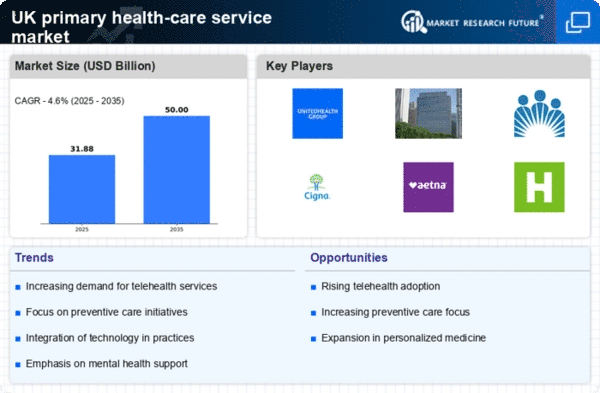Government Initiatives and Funding
Government initiatives play a crucial role in shaping the primary health-care-service market in the UK. Recent policies have focused on increasing funding for primary care services, with the NHS budget for primary care projected to reach £12 billion by 2025. This financial support aims to enhance service delivery, improve patient access, and reduce waiting times. Furthermore, the government is promoting integrated care systems, which encourage collaboration between various health services to provide comprehensive care. These initiatives are likely to foster innovation and efficiency within the primary health-care-service market, as providers are incentivized to adopt new technologies and practices. The ongoing commitment to funding and policy reform suggests a robust future for primary health-care services, ultimately benefiting patients and healthcare professionals alike.
Increasing Demand for Accessible Care
The primary health-care-service market in the UK is experiencing a notable increase in demand for accessible care. This trend is driven by an aging population, with projections indicating that by 2030, over 18% of the UK population will be aged 65 and above. As the demographic shifts, the need for primary health-care services that cater to chronic conditions and preventive care becomes paramount. Additionally, the rise in health awareness among the public has led to a greater emphasis on early diagnosis and treatment. Consequently, healthcare providers are adapting their services to meet these demands, which is likely to enhance patient satisfaction and improve health outcomes. This shift towards accessibility is expected to shape the primary health-care-service market, as stakeholders invest in infrastructure and workforce to accommodate the growing patient base.
Rising Health Awareness and Education
Rising health awareness among the UK population is a significant driver of the primary health-care-service market. Public campaigns and educational initiatives have led to increased knowledge about health issues, preventive measures, and available services. As individuals become more informed, they are more likely to seek regular check-ups and screenings, which can lead to early detection of health problems. This trend is reflected in the growing participation in health programs, with a reported 25% increase in health checks conducted in primary care settings over the past year. Consequently, healthcare providers are adapting their services to accommodate this proactive approach to health management. The heightened focus on health education is likely to continue influencing the primary health-care-service market, as it encourages a culture of prevention and wellness.
Technological Advancements in Healthcare
Technological advancements are significantly influencing the primary health-care-service market in the UK. The integration of electronic health records (EHRs) and telemedicine platforms is transforming how healthcare providers deliver services. As of 2025, approximately 70% of GP practices are expected to utilize EHRs, streamlining patient information management and enhancing communication between healthcare professionals. Moreover, the adoption of artificial intelligence (AI) in diagnostics and treatment planning is gaining traction, potentially improving patient outcomes. These innovations not only increase efficiency but also empower patients to take an active role in their health management. The ongoing evolution of technology in healthcare indicates a promising trajectory for the primary health-care-service market, as it adapts to meet the needs of a tech-savvy population.
Shift Towards Patient-Centric Care Models
The primary health-care-service market in the UK is witnessing a shift towards patient-centric care models. This approach emphasizes the importance of tailoring healthcare services to meet individual patient needs and preferences. As patients increasingly seek personalized care experiences, healthcare providers are adapting their practices to enhance patient engagement and satisfaction. Initiatives such as shared decision-making and personalized treatment plans are becoming more prevalent, reflecting a broader trend towards holistic care. This shift is supported by research indicating that patient-centered care can lead to improved health outcomes and increased patient loyalty. As the primary health-care-service market evolves, the focus on patient-centric models is likely to drive innovation and improve the overall quality of care.
















Leave a Comment